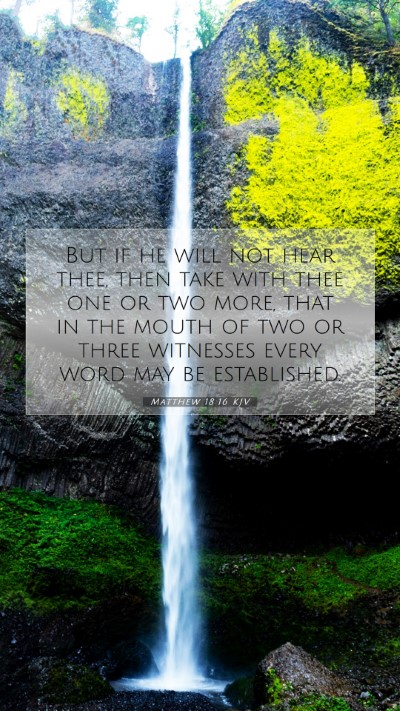Understanding Matthew 18:16: A Comprehensive Commentary
Bible Verse: Matthew 18:16 states, "But if he will not hear thee, then take with thee one or two more, that in the mouth of two or three witnesses every word may be established."
Overview of the Verse
This verse is a part of Jesus' teachings regarding conflict resolution within the church community. Here, Matthew 18:16 serves as a guiding principle for discipline and reconciliation among brethren. The process outlined underscores the importance of establishing facts through multiple testimonies, aligning with the Jewish legal tradition.
Key Themes and Insights
- Process of Resolution: The verse emphasizes escalation in conflict resolution; first, one should approach the offending party alone, and if necessary, involve others.
- Role of Witnesses: The mention of "two or three witnesses" reflects Deuteronomic law (Deuteronomy 19:15) where multiple witnesses ensure the truth of a matter.
- Community Involvement: Involving the community fosters accountability and restores relationships within the body of Christ.
Bible Verse Meanings and Interpretations
According to public domain commentaries:
- Matthew Henry: Henry elucidates that the act of bringing others into a dispute serves as a means of corroborating the claims made and provides a path towards reconciliation.
- Albert Barnes: Barnes notes that this approach is a clear instruction from Christ to solve disagreements honestly and without malice. It demonstrates care for the soul of the offended and the offender.
- Adam Clarke: Clarke comments that the process reflects the gravity of reconciliation, emphasizing the need for humility and love in addressing conflicts.
Practical Applications
Understanding this verse can guide individuals in the following ways:
- Bible Study Groups: It serves as a foundational teaching for Bible study groups focusing on conflict resolution.
- Online Bible Study: Incorporating these principles into online Bible study resources can help Christians navigate issues within their communities.
- Daily Life Applications: Each believer can apply the teachings of this verse when confronting personal disagreements and fostering peace in relationships.
In-depth Biblical Exegesis
Exegesis of Matthew 18:16 reveals a structured process intended not only for peacebuilding but also for fortifying the communal bonds within the church. This approach reflects the heart of Jesus' teaching: that reconciliation is paramount.
Cross References
This verse connects with several other scriptural passages:
- Matthew 18:15: Directs the believer to approach the errant brother alone first.
- Deuteronomy 19:15: Establishes the principle of needing multiple witnesses.
- Galatians 6:1: Encourages restoration of the one overtaken in a fault with a spirit of gentleness.
- James 5:19-20: Mentions the importance of bringing back those who wander from the truth.
- 1 Timothy 5:19: Advises against receiving an accusation against an elder except by two or three witnesses.
Conclusion
Understanding Matthew 18:16: This verse provides insight into managing grievances within a Christian context. The established process promotes a culture of reconciliation and accountability. Employing the structure offered in this passage can enrich personal Bible study lessons and guide believers in applying biblical principles to daily life. The emphasis on community involvement and the careful approach to resolving conflicts reflects Christ's enduring wisdom.


